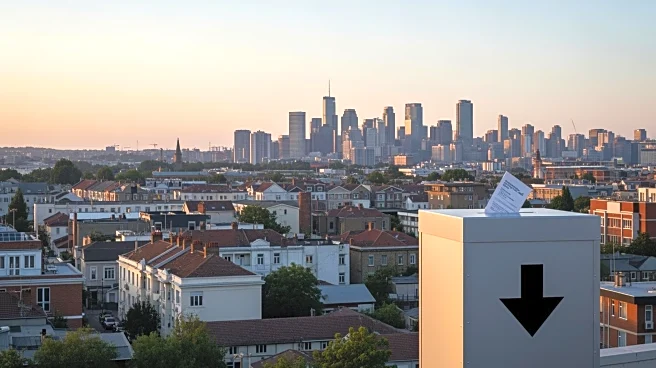What's Happening?
New York City voters have approved several housing ballot proposals aimed at addressing the city's housing shortage and affordability crisis. The measures, developed by an independent commission under
Mayor Eric Adams, include fast-tracking affordable housing development and creating a streamlined public review process for such projects. The proposals also establish an Affordable Housing Appeals Board to oversee land use decisions related to affordable housing. Despite opposition from the City Council, which argued that the measures would weaken community power and lead to more gentrification, the proposals were passed by voters. The approval of these measures aligns with the housing agenda of newly elected Mayor Zohran Mamdani, who aims to build 200,000 affordable homes over the next decade.
Why It's Important?
The approval of these housing measures is significant as it represents a shift in how New York City plans to tackle its housing crisis. By streamlining the process for developing affordable housing, the city aims to increase the availability of affordable units, particularly in neighborhoods that have lagged in new construction. This could potentially alleviate some of the pressures of gentrification by providing more housing options for low-income residents. However, the City Council's concerns about the loss of community power highlight the ongoing debate over how best to balance development with community needs. The outcome of these measures could set a precedent for other cities facing similar housing challenges.
What's Next?
With the passage of these proposals, Mayor-elect Zohran Mamdani is expected to push forward with his ambitious housing agenda. This includes freezing rents for stabilized tenants and expanding programs for low-income families. The new Affordable Housing Appeals Board will play a crucial role in overseeing land use decisions, potentially overturning City Council decisions on certain projects. As the city moves forward, stakeholders such as landlords and developers may respond to these changes, particularly regarding the impact on property values and the availability of capital for building maintenance. The implementation of these measures will be closely watched as a test case for urban housing policy.
Beyond the Headlines
The ethical implications of the City Council's campaign against the ballot measures have raised questions about the use of government resources to influence voter decisions. Additionally, the broader cultural and social impacts of these housing policies will be significant, as they may redefine community dynamics and the balance of power between local government and residents. The long-term success of these measures will depend on their ability to deliver on promises of increased affordability without exacerbating displacement or gentrification.








